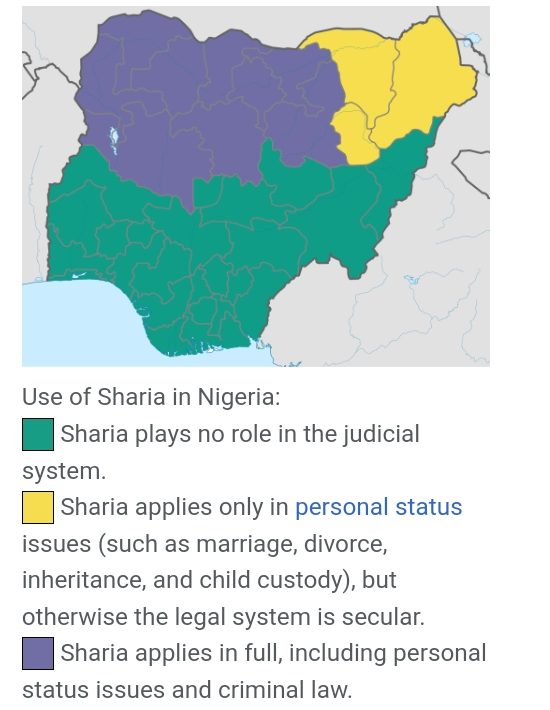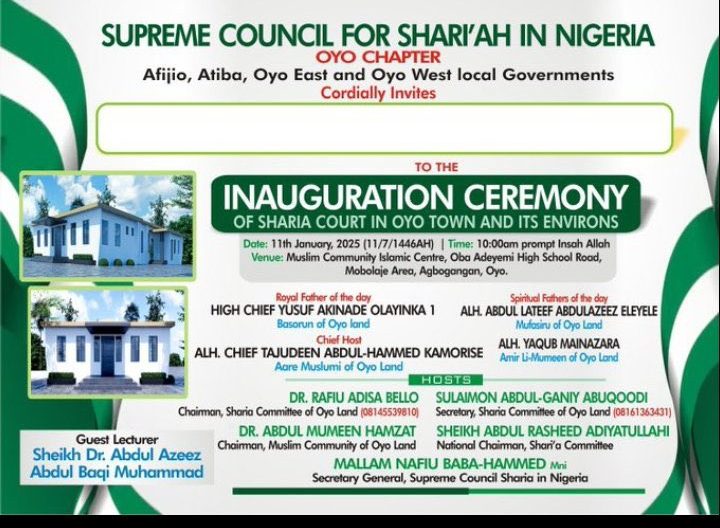The practice of Sharia law in Nigeria, a secular and multi-religious country, has long been contentious. This debate has intensified with concerns about its perceived spread beyond the 12 Muslim-majority northern states where it is primarily practised.
Sharia law, derived from Islamic teachings in the Qur’an and interpretations from the Hadith and Sunna, was integrated into Nigeria’s legal system in 1999. It serves as a framework for Islamic living, outlining the standards believers must uphold and the penalties for violations.
In 12 northern states, Sharia law was adopted as civil and criminal law, starting with Zamfara State under then-Governor Ahmad Sani Yerima. The other states include Sokoto, Kebbi, Niger, Kano, Katsina, Kaduna, Jigawa, Yobe, Bauchi, Borno, and Gombe.

Although Sharia law is constitutionally supported under Sections 5(f) and (g), its jurisdiction is restricted to civil matters involving Muslims. Section 277 of the Constitution further defines the scope of a state’s Sharia Court of Appeal.
However, there is a widely held concern that its adoption in a state could extend its influence to everyone residing there, including non-Muslims. In northern states where Sharia law is practised, reports have shown that the businesses and personal lives of non-Muslims have been/ are being disrupted. Its encroachment into non-Muslim-dominated regions, such as the South-West, further raises concerns about religious imposition.
Sharia Arbitration Panels in the South-West
The establishment of an Independent Sharia Arbitration Panel in Ekiti State recently gained attention on the internet. Chaired by three Kadhis, the panel held its first sitting at the Oja Oba Central Mosque in Ado-Ekiti and resolved two marriage-related disputes.
The move drew criticism from residents and community leaders. Following consultations with chiefs, community members, and Islamic leaders, the Ewi of Ado-Ekiti, Oba Adeyemo Adejugbe, dissolved the panel. He argued that existing courts, such as the Customary Court and High Court, are sufficient for addressing religious and cultural disputes.
The legal structure in Ekiti State has been sufficient for handling marriage and inheritance issues without agitation,” Oba Adejugbe said.
He warned that allowing religious panels could lead to similar demands from other faiths, causing unnecessary tensions. The state government supported the decision. Attorney General of the state Dayo Apata (SAN) clarified that Ekiti’s legal system does not recognise Sharia Courts or Arbitration Panels.

The Case of Oyo State
This development in Ekiti mirrors a recent controversy in Oyo State, where plans to introduce a Sharia Court were met with resistance. The state Governor, Seyi Makinde, assured residents that no religious law would override constitutional provisions. While arbitration among Muslims is permissible, he emphasised that such arrangements must align with Nigeria’s legal framework.
The Supreme Council for Sharia in Nigeria clarified its intentions following a public uproar. It described the proposed body as an Independent Sharia Arbitration Panel for resolving family disputes among Muslims, stating that it would lack enforcement powers and would not operate as a court. Dr Bello Adisa, chairman of the organising committee, apologised for earlier misrepresentations and explained that similar panels already exist in other South-West states for voluntary arbitration.
Sharia Jurisdiction vs. Constitutional Provisions
The gradual spread of Sharia law into the South-West has raised concerns about potential religious tension. Chapter 1, Section 10 of the Nigerian Constitution prohibits adopting any religion as a state religion, while Section 38 guarantees freedom of thought, conscience, and religion. Section 38(1) specifically provides:
Despite these constitutional provisions, some fear that Sharia law’s presence in multi-religious states might infringe on the rights of non-Muslims. Nigeria’s history of religious and ethnic clashes amplifies these concerns. Proponents argue that Sharia law provides justice for Muslims in personal matters, while opponents caution against the potential misuse of religion as a political tool. Also, while its advocates maintain that Sharia applies only to Muslims, there is growing concern about the impact of Sharia laws on non-Muslims.
The Constitution is clear and supreme.
The Nigerian Constitution explicitly addresses these concerns. The 1999 Constitution, as the supreme law, guarantees individual rights, including the freedom to practise any religion. Section 5(f), (g), and (h) permits states to establish courts based on common or customary law systems. In northern states, Sharia courts operate alongside customary and standard law courts, with Sharia appellate courts primarily addressing civil matters.
Section 277(1) of the Constitution outlines the jurisdiction of a state’s Sharia Court of Appeal:
- The Sharia Court of Appeal of a state shall exercise appellate and supervisory jurisdiction in civil proceedings involving questions of Islamic personal law within its competence as outlined in subsection (2).
- Subsection (2) details specific matters the court may decide, including marriage, inheritance, family relations, and guardianship, provided all parties are Muslims.
However, the concerns of Nigerians who worry about the spread of Sharia law are valid. Therefore, state governments must uphold the Constitution by safeguarding constitutional provisions. Nigeria can protect its religious diversity and prevent any faith from dominating its legal framework.









